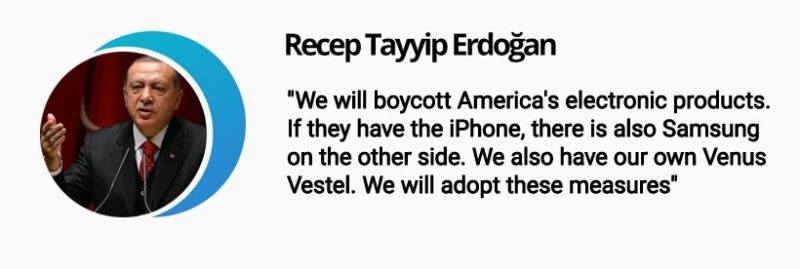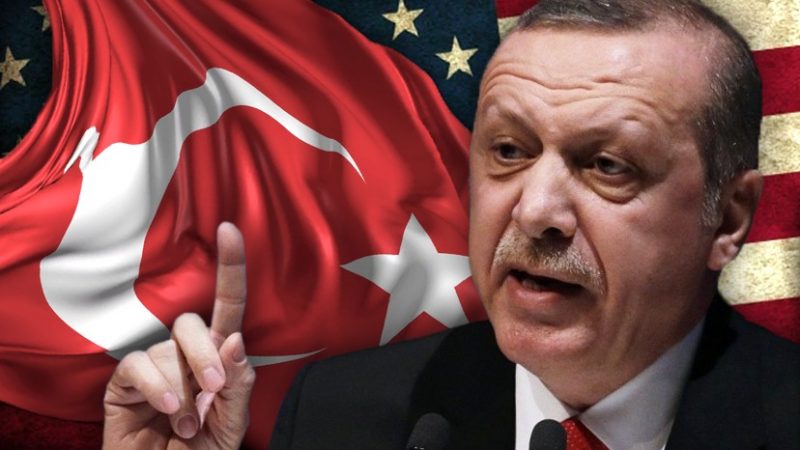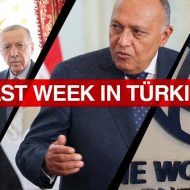The relationship between Turkey and the US has reached a critical point. Sanctions against two Turkish ministers alongside new tariffs on steel and aluminium have destroyed the former strategic partnership of the two NATO members. The situation is critical: no compromise is in sight, and every day brings new tariffs and critical assessments. Erdogan is accusing the US of disrespectful behavior, and Trump continues to impose new sanctions. The Turkish Lira remains unstable.
I have just authorized a doubling of Tariffs on Steel and Aluminum with respect to Turkey as their currency, the Turkish Lira, slides rapidly downward against our very strong Dollar! Aluminum will now be 20% and Steel 50%. Our relations with Turkey are not good at this time!
— Donald J. Trump (@realDonaldTrump) August 10, 2018
Turkey strikes back
The Turkish president declared that those responsible for unleashing economic war against Turkey, “must pay for it.” Erdogan drew attention to the fact that the United States aggressive actions have hit not only Turkey, but also other states (in particular, Russia, China and Canada). The United States has struck a blow against the entire anti-globalist block.
In response to US restrictions and diplomatic scandals, Erdogan mentioned a boycott of American electronics, adding that there is an alternative to goods from America. “While they have iPhones, we can choose Samsung instead,” Erdogan declared.

Context of the US-Turkey conflict
The conflict between the US and Turkey escalated after the attempted Gulenist coup d’etat in 2016, when the forces of Fethullah Gulen tried to seize power from Erdogan. Among those detained in Turkey in relation to the coup was the American pastor Andrew Brunson, who is now being used by the Americans to ramp up pressure against the Turkish state.
Forecasts in the US-Turkey conflict
On the 13th of August Erdogan, commenting the imposition of tariffs, called the actions of Washington “a stab in the back.” He stressed that the partnership with Washington “may be under threat”.
“On the one hand, you are talking about a strategic alliance, on the other, you are stabbing your partner in the back,” Erdogan said. “We can not accept this.”
Turkey joined NATO in 1952, and during the Cold War, they maintained a strong alliance with Western powers. The Injirlik military base is still operating in Turkey, and transactions are still primarily conducted in dollars.
However, the new developments might radically change the situation: diplomatic scandals, sanctions, new tariffs, and the support of forces in Kurdistan by the US will lead Ankara further away from a pro-American path.
Washington is still one of the five major trade partners of Ankara, therefore, the sanctions and the possibility of a total diplomatic break would cause serious problems for the Turkish government.
The exchange rate of the Lira began to decrease sharply against the background of sanctions and increased tariffs. On August 13, the Turkish Central Bank was forced to announce emergency measures to protect its financial stability. The Central Bank of Turkey said that it would allocate more than $ 10 billion dollars to support its national banks from economic fallout.
One of the most important issues in Turkey’s geopolitical situation is its membership in the NATO bloc. Will Erdogan, who has to the present attempted a balance between US and Eurasian geopolitical vectors reconsider Turkey’s participation in NATO altogether?
Erdogan’s rhetoric about a rupture of relations between US and Turkey, the economic war, and his expressed intentions to enter the BRICS block suggest that Erdogan might consider renegotiating the terms of Turkey’s engagement in NATO, and even more radically, that he might attempt to leave the alliance altogether. The most clear sign which would confirm his intentions would be the closure of the Injirlik base and the announcement of ditching the dollar in order to utilize the currency of a BRICS memeber. If we consider that the Turkish people are aready oriented toward an anti-globalism path, such maneuvers would strengthe Erdogan’s domestic position, and grant Turkey new possibilities in the international arena.









Leave a Reply